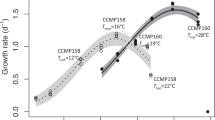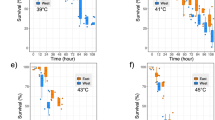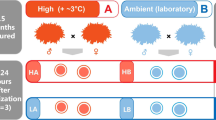Abstract
Some animals have the remarkable capacity to acclimate across generations to projected future climate change1,2,3,4; however, the underlying molecular processes are unknown. We sequenced and assembled de novo transcriptomes of adult tropical reef fish exposed developmentally or transgenerationally to projected future ocean temperatures and correlated the resulting expression profiles with acclimated metabolic traits from the same fish. We identified 69 contigs representing 53 key genes involved in thermal acclimation of aerobic capacity. Metabolic genes were among the most upregulated transgenerationally, suggesting shifts in energy production for maintaining performance at elevated temperatures. Furthermore, immune- and stress-responsive genes were upregulated transgenerationally, indicating a new complement of genes allowing the second generation of fish to better cope with elevated temperatures. Other differentially expressed genes were involved with tissue development and transcriptional regulation. Overall, we found a similar suite of differentially expressed genes among developmental and transgenerational treatments. Heat-shock protein genes were surprisingly unresponsive, indicating that short-term heat-stress responses may not be a good indicator of long-term acclimation capacity. Our results are the first to reveal the molecular processes that may enable marine fishes to adjust to a future warmer environment over multiple generations.
This is a preview of subscription content, access via your institution
Access options
Subscribe to this journal
Receive 12 print issues and online access
$209.00 per year
only $17.42 per issue
Buy this article
- Purchase on Springer Link
- Instant access to full article PDF
Prices may be subject to local taxes which are calculated during checkout



Similar content being viewed by others
References
Donelson, J. M., Munday, P. L., McCormick, M. I. & Pitcher, C. R. Rapid transgenerational acclimation of a tropical reef fish to climate change. Nature Clim. Change 2, 30–32 (2012).
Miller, G. M., Watson, S-A., Donelson, J. M., McCormick, M. I. & Munday, P. L. Parental environment mediates impacts of increased carbon dioxide on a coral reef fish. Nature Clim. Change 2, 858–861 (2012).
Salinas, S. & Munch, S. B. Thermal legacies: Transgenerational effects of temperature on growth in a vertebrate. Ecol. Lett. 15, 159–163 (2012).
Shama, L. N. S., Strobel, A., Mark, F. C. & Wegner, K. M. Transgenerational plasticity in marine sticklebacks: Maternal effects mediate impacts of a warming ocean. Funct. Ecol. 28, 1482–1493 (2014).
Poloczanska, E. S. et al. Global imprint of climate change on marine life. Nature Clim. Change 3, 919–925 (2013).
Munday, P. L., Warner, R. R., Monro, K., Pandolfi, J. M. & Marshall, D. J. Predicting evolutionary responses to climate change in the sea. Ecol. Lett. 16, 1488–1500 (2013).
Palumbi, S. R., Barshis, D. J., Traylor-Knowles, N. & Bay, R. A. Mechanisms of reef coral resistance to future climate change. Science 344, 895–898 (2014).
Munoz, N. J., Farrell, A. P., Heath, J. W. & Neff, B. D. Adaptive potential of a Pacific salmon challenged by climate change. Nature Clim. Change 5, 163–166 (2015).
Nilsson, G. E., Crawley, N., Lunde, I. G. & Munday, P. L. Elevated temperature reduces the respiratory scope of coral reef fishes. Glob. Change Biol. 15, 1405–1412 (2009).
Portner, H. O. & Farrell, A. P. Physiology and climate change. Science 322, 690–692 (2008).
Portner, H. O. & Knust, R. Climate change affects marine fishes through the oxygen limitation of thermal tolerance. Science 315, 95–97 (2007).
Johansen, J. L. & Jones, G. P. Increasing ocean temperature reduces the metabolic performance and swimming ability of coral reef damselfishes. Glob. Change Biol. 17, 2971–2979 (2011).
Eliason, E. J. et al. Differences in thermal tolerance among sockeye salmon populations. Science 332, 109–112 (2011).
Killen, S. S. et al. Aerobic scope predicts dominance during early life in a tropical damselfish. Funct. Ecol. 28, 1367–1376 (2014).
Rummer, J. L. et al. Life on the edge: Thermal optima for aerobic scope of equatorial reef fishes are close to current day temperatures. Glob. Change Biol. 20, 1055–1066 (2014).
Altschul, S. F. et al. Gapped BLAST and PSI-BLAST: A new generation of protein database search programs. Nucleic Acids Res. 25, 3389–3402 (1997).
Hazel, J. R. Thermal adaptation in biological membranes: Is homeoviscous adaptation the explanation? Annu. Rev. Physiol. 57, 19–42 (1995).
Kieffer, J. D., Alsop, D. & Wood, C. M. A respirometric analysis of fuel use during aerobic swimming at different temperatures in rainbow trout (Oncorhynchus mykiss). J. Exp. Biol. 201, 3123–3133 (1998).
McClelland, G. B. Fat to the fire: The regulation of lipid oxidation with exercise and environmental stress. Comp. Biochem. Phys. B 139, 443–460 (2004).
Kassahn, K. S., Crozier, R. H., Ward, A. C., Stone, G. & Caley, J. M. From transcriptome to biological function: Environmental stress in an ectothermic vertebrate, the coral reef fish Pomacentrus moluccensis. BMC Genom. 8, 358–374 (2007).
Podrabsky, J. E. & Somero, G. N. Changes in gene expression associated with acclimation to constant temperatures and fluctuating daily temperatures in an annual killifish Austrofundulus limnaeus. J. Exp. Biol. 207, 2237–2254 (2004).
Bly, J. E., Grimm, A. S. & Morris, I. G. Transfer of passive immunity from mother to young in a teleost fish: Haemagglutinating activity in the serum and eggs of plaice, Pleuronectes platessa L. Comp. Biochem. Phys. A 84, 309–313 (1986).
Lemke, H. & Lange, H. Is there a maternally induced immunological imprinting phase a la Konrad Lorenz? Scand. J. Immunol. 50, 348–354 (1999).
Bonga, S. E. W. The stress response in fish. Physiol. Rev. 77, 591–625 (1997).
Xiong, X., He, H. & Sun, Y. Ribosomal protein S27-like and S27 interplay with p53-MDM2 axis as a target, a substrate and a regulator. Oncogene 30, 1798–1811 (2011).
Zeldin, D. C. Epoxygenase pathways of arachidonic acid metabolism. J. Biol. Chem. 276, 36059–36062 (2001).
Yang, B. et al. Overexpression of cytochrome P450 protects against hypoxia-reoxygenation injury in cultured bovine aortic endothelial cells. J. Pharmacol. Exp. Ther. 60, 310–320 (2001).
Chen, G. et al. CYP2J2 overexpression attenuates nonalcoholic fatty liver disease induced by high-fat diet in mice. Am. J. Physiol. Endocrinol. Metab. 308, E97–E110 (2015).
Feder, M. E. & Hofmann, G. E. Heat-shock proteins, molecular chaperones, and the stress response: Evolutionary and ecological physiology. Annu. Rev. Physiol. 61, 243–282 (1999).
Lukash, T. O., Turkivska, H. V., Negrutskii, B. S. & El’skaya, A. V. Chaperone-like activity of mammalian elongation factor eEF1A: Renaturation of aminoactyl-tRNA synthetases. Int. J. Biochem. Cell Biol. 36, 1341–1347 (2004).
Basu, N. et al. Heat shock protein genes and their functional significance in fish. Gene 295, 173–183 (2002).
Acknowledgements
This study was supported by the Australian Research Council (ARC) and the ARC Centre of Excellence for Coral Reef Studies (P.L.M. and W.L.), the Competitive Research Funds OCRF-2014-CRG3-62140408 from the King Abdullah University of Science and Technology (T.Ravasi, M.L.B., T.Ryu, L.S., and Y.G.), the Australian Coral Reef Society (H.D.V.), and a GBRMPA Science for Management Award (H.D.V.). This project was completed under JCU Ethics A1233 and A1415. We thank J. L. Rummer for comments on the manuscript and members of the Molecular Ecology and Evolution Laboratory (JCU), Marine and Aquaculture Research Facilities Unit (JCU), Integrative Systems Biology Laboratory (KAUST), and Biosciences Core Laboratory (KAUST) for support and assistance.
Author information
Authors and Affiliations
Contributions
J.M.D. and P.L.M. designed and managed the fish rearing experiments. J.M.D. performed metabolism experiments. H.D.V. prepared samples for sequencing. T.Ryu assembled transcriptome. T.Ryu, T.Ravasi, L.S. and Y.G. analysed expression and assessed assembly quality. H.D.V. performed quantitative real-time-PCR expression validation. H.D.V. analysed the data. H.D.V., P.L.M., T.Ryu, J.M.D., L.v.H., M.L.B., W.L. and T.Ravasi wrote the paper and all authors read and approved the manuscript.
Corresponding authors
Ethics declarations
Competing interests
The authors declare no competing financial interests.
Supplementary information
Rights and permissions
About this article
Cite this article
Veilleux, H., Ryu, T., Donelson, J. et al. Molecular processes of transgenerational acclimation to a warming ocean. Nature Clim Change 5, 1074–1078 (2015). https://doi.org/10.1038/nclimate2724
Received:
Accepted:
Published:
Issue Date:
DOI: https://doi.org/10.1038/nclimate2724
This article is cited by
-
The effect of temperature and invasive alien predator on genetic and phenotypic variation in the damselfly Ischnura elegans: cross-latitude comparison
Frontiers in Zoology (2023)
-
Transgenerational effects influence acclimation to varying temperatures in Aurelia aurita polyps (Cnidaria: Scyphozoa)
Hydrobiologia (2023)
-
Paternal hypoxia exposure primes offspring for increased hypoxia resistance
BMC Biology (2022)
-
Microbiota mediated plasticity promotes thermal adaptation in the sea anemone Nematostella vectensis
Nature Communications (2022)
-
Swimming performance of sharks and rays under climate change
Reviews in Fish Biology and Fisheries (2022)



